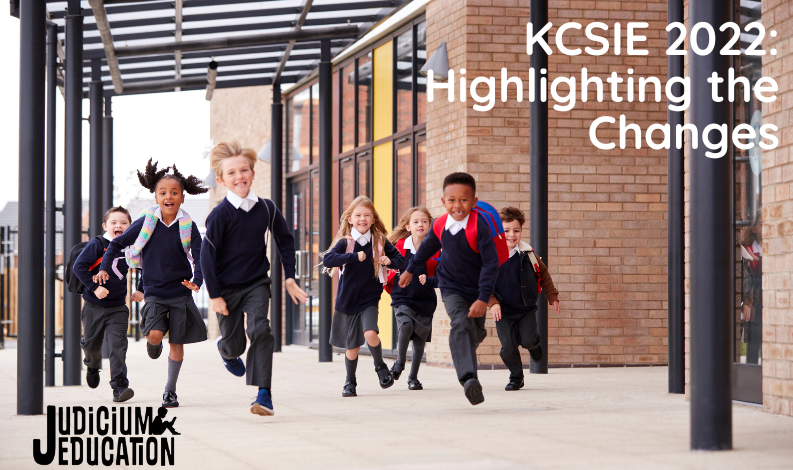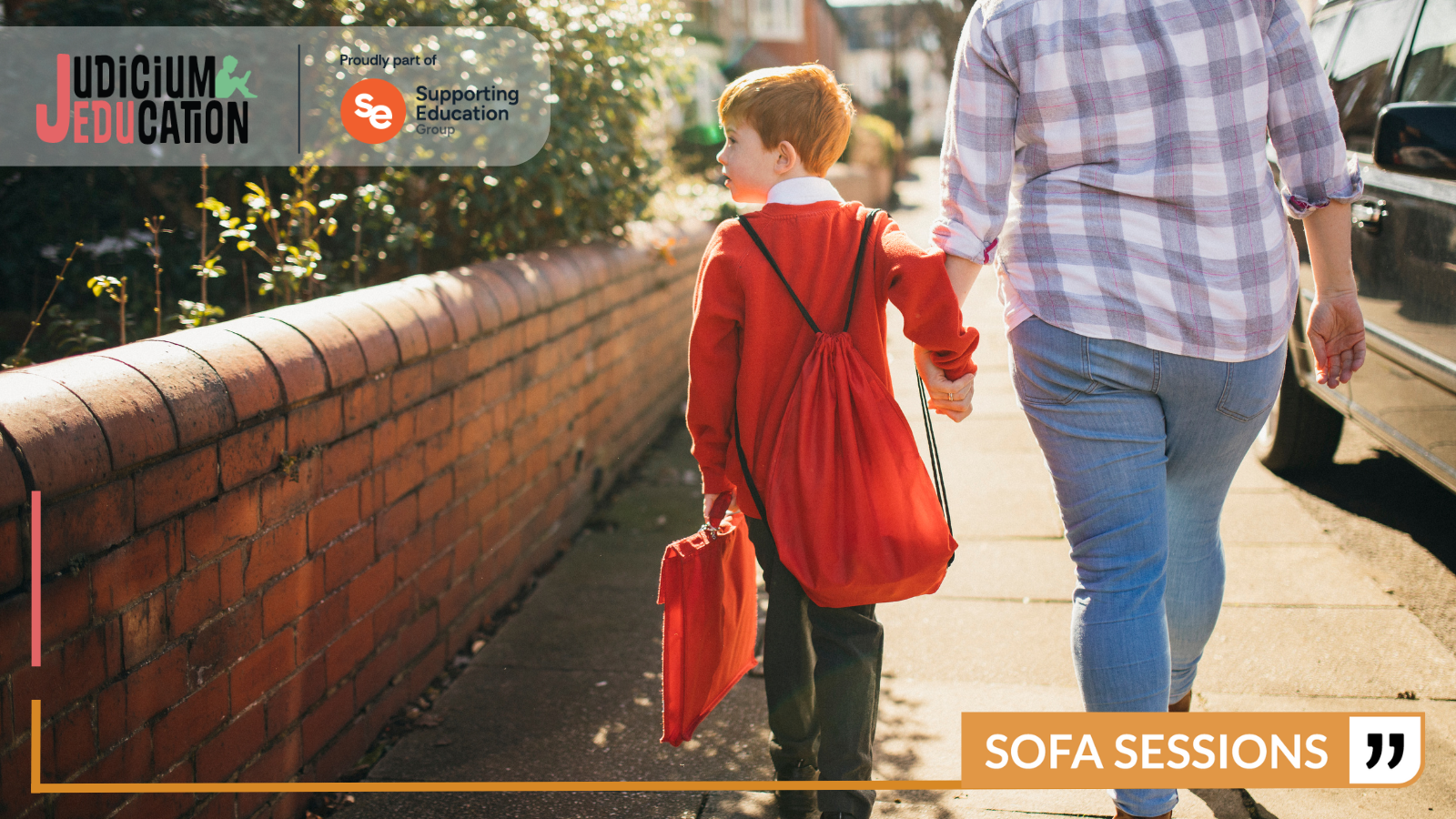KCSIE 2022: Highlighting the Changes

This blog is based on Judicium’s Safeguarding ‘Sofa Session’ from the 29th of June, with our expert Hannah Glossop. This session focused on key updates to Keeping Children Safe in Education 2022, suggested changes for child protection policies, and suggestions for September safeguarding training for staff.
The Changes to KCSIE Parts One and Two
On 20th May 2022, the Department for Education published KCSIE 2022, which will come into force on 1st September 2022
Part one: Safeguarding information for all staff
- New paragraph added outlining that all staff should understand that children may not feel ready or know how to tell someone they are being abused: “This should not prevent staff from having a professional curiosity and speaking to the DSL if they have concerns about a child”
- New paragraph adding on domestic abuse and how children can be victims of this
Part two: The management of safeguarding
- A new requirement for ALL governors and trustees to receive, “appropriate safeguarding and child protection (including online) training at induction.”
- It should equip them to test and assure themselves that the safeguarding policies and procedures in place are effective and support a robust, whole school approach to safeguarding.
- It should be regularly updated.
Please see here for details of Judicium’s CPD Safeguarding e-learning package that is available for unlimited usage across the school and appropriate for governors.
- Further guidance stressing the importance of adhering to the Human Rights Act 1998 (HRA) and European Convention on Human Rights (ECHR), the Equality Act 2010 and the Public Sector Equality Duty (PSED).
- Supporting parents with online safety:
- Communications should be used to reinforce the importance of children being safe online.
- Parents and carers are likely to find it helpful to understand what systems schools and colleges use to filter and monitor online use.
- It will be especially important for parents and carers to be aware of what their children are being asked to do online, including the sites they will asked to access and be clear who from the school or college (if anyone) their child is going to be interacting with online.
- When outlining the need for appropriate filtering and monitoring systems, KCSIE now says schools should “regularly review their effectiveness.”
- Virtual School Head:
- In offering advice and information to workforces that have relationships with children with social workers, virtual school heads should identify and engage with key professionals, helping them to understand the role they have in improving outcomes for children.
- Sub-section focusing on how LGBT can be targeted by other children, and the need for staff to, “reduce the additional barriers faced, and provide a safe space for them to speak out or share their concerns with members of staff.”
The Changes to KCSIE Parts Three, Four and Five
Part three: Safer recruitment
- A reminder that the DBS does not charge for checks on volunteers
- Considering online searches as part of the shortlisting process:
- Schools and colleges should consider carrying out an online search as part of their due diligence on the shortlisted candidates.
- It may help identify any incidents or issues that have happened, and are publicly available online, which the school or college might want to explore with the applicant at interview.
- All schools should be clear on how they are approaching safer recruitment, and what they tell candidates about it.
Part four: Allegations made against and/or concerns raised in relation to teachers (including supply teachers, other staff, volunteers and contractors)
- The title of Part Four has been changed (see above)
- Update to examples of low-level concerns to include:
- Being ‘overly friendly’ with children
- Having favourites
- Taking photographs of children on their mobile phone, contrary to school policy
- Engaging with a child on a one-to-one basis in a secluded area or behind a closed door
- Humiliating pupils
- Reporting Low-level concerns – Schools may choose whether all low-level concerns are reported to the DSL, a nominated person, or with the headteacher/principal.
- If the former, then the DSL should inform the headteacher of all the low-level concerns in a timely fashion.
- The headteacher should be the ultimate decision maker in respect of all low-level concerns, although it is recognised that the headteacher may wish to consult with the DSL and take a more collaborative decision-making approach.
- If schools are in any doubt as to whether a low-level concern meets the harm threshold, they should consult their LADO.
Part five: Child on child sexual violence and sexual harassment
- The structure of Part Five has changed and now includes lots of information from the ‘Sexual violence and sexual harassment between children in schools and colleges’ guidance, which will be withdrawn from September 2022.
- More case studies have been added to Part Five
- It highlights the importance of ensuring children understand that the law on child-on-child abuse is there to protect them rather than criminalise them.
- There is a new bullet point on understanding intra familial harms and any necessary support for siblings following incidents.
- Annex B continues to be the old Annex A and gives further information about types of abuse and safeguarding issues.
- Further support links have been added to this section, such as a link to the County Lines Toolkit for Professionals.
Suggested Actions for Schools to Take
1. Schedule time to read the updated guidance NB: Remember KCSIE 2022 goes live on 1st September 2022, so changes do not need to be embedded straight away
2. Review your safeguarding training for the next academic year, ensuring that the following key topics are covered:-
- Low level concerns
- Domestic abuse
- The need for professional curiosity
- Child on child abuse
- Any “older” topics that your staff may feel less confident in
-
- Low level concerns
- The need for professional curiosity from all staff
- Child on child abuse (language change)-withdraw mentions of ‘Sexual violence and sexual harassment between children in schools and colleges’ guidance
- Approach to online searches for shortlisted candidates
- Changes to e-safety
4. Check that your safer recruitment processes remain compliant with the updated Parts 3 and 4
5. Consider which safeguarding training you will provide to governors
Safer Recruitment Notes - https://www.judiciumeducation.co.uk/news/HR-Safer-Recruitment
Low-level Concerns Notes - https://www.judiciumeducation.co.uk/news/managing-low-level-concerns-around-adults-in-your-setting
You can follow us on Twitter: @JudiciumSG @JudiciumEDU
If you’d like to review Judicium’s forthcoming sofa sessions please click here
© This content is the exclusive property of Judicium Education. The works are intended to provide an overview of the sofa session you attend and/or to be a learning aid to assist you and your school. However, any redistribution or reproduction of part or all of the contents in any form is prohibited. You may not, except with our express written permission, distribute or exploit the content. Failure to follow this guidance may result in Judicium either preventing you with access to our sessions and/or follow up content.
Related content

This blog is based on Judicium’s Safeguarding ‘Sofa Session’ from the 4th February 2026, with our resident experts Joanne Bocko and Sarah Cook.
.png)
This is a summary from Judicium’s Safeguarding and Thrive ‘Sofa Session’ from 3rd December, with our Judicium Safeguarding consultant Joanne Bocko, Thrive Head of Innovation and Principal Trainer, Viv Trask-Hall and Director of Thrive, Tom Preston. Drawing on decades of combined experience in safeguarding, governance, SEND, leadership, and mental health, the panel unpacked how the framework’s shifts will impact schools, what Ofsted will be looking for, and how leaders can position themselves for success.

This is a summary taken from Judicium’s SEND and Safeguarding ‘Sofa Session’ from 5th November, with our Safeguarding and SEND consultants Rik Chilvers and Simon Hanley. In this session we discuss the new SEND and Safeguarding toolkit and how to best prepare for an Ofsted visit.
.png)
This blog is based on Judicium’s Safeguarding Client Survey Uncovered - Insights from the sofa session from 8th October with our Safeguarding Consultant Joanne Bocko.
.png)
This blog is based on Judicium’s Safeguarding - Back to school: Are you KCSIE ready? sofa session from 10th September with our Head of safeguarding, Kate Massey . In this session we take a look at the key updates for KCSIE 2025, and how best to prepare for the start of the new academic year.

This blog is based on Judicium’s Safeguarding Supervision On The Sofa: Your DSLs Safe Space ‘Sofa Session’ from the 25th June 2025, with our resident experts Helen King and Sarah Cook.

Sofa Sessions | Safeguarding